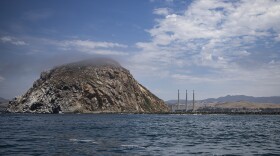-
Hawaiian crows are extinct in the wild and are found nowhere else on Earth. Now, a small group, safeguarded in captivity, has been released in the forests of Maui.
-
Federal workers at the home agency for the National Weather Service are concerned about a potential overhaul by Trump officials focused on cutting government costs.
-
SANDAG has long envisioned a new rail line from the border to Sorrento Mesa. But a recent planning study found immense cost and engineering challenges.
-
The federal government hopes former coal towns will help the nuclear industry grow, by taking on the decades-long challenge of storing radioactive waste
-
The weather phenomena are common for California winters, but they could cause dangerous debris flows or mudslides in recently burned areas.
-
Another cocoa harvest in West Africa has come up short, leading to the worst deficit in decades. That means higher prices for chocolate makers and for shoppers.
-
The planet has been shattering heat records for the past two years. That was expected to ease in January — and the fact that it didn't has climate researchers worried.
-
Without federal support, American communities will struggle to deal with a challenge as pervasive as climate change, market analysts and environmental advocates say.
-
After thousands of homes were destroyed, many are looking for ways to make Los Angeles safer from wildfires. But clearing dense shrubs on the hillsides could actually make the fire danger worse.
-
A majority of employees who work in the EPA's Office of Environmental Justice and External Civil Rights have been put on paid leave effective immediately. They all work on environmental justice issues or on diversity, equity and inclusion.
RELATED STORIES
Sign up for our newsletters!
Keep up with all the latest news, arts and culture, and TV highlights from KPBS.
- San Diego is building a lot of homes in its most walkable neighborhoods
- City Council clears way for tiered parking rates at San Diego Zoo
- San Diego to pay $875K to man shot with police bean bag rounds and bitten by K-9
- Oceanside city council approves new tenant protections, rejects rent control
- San Diego class-action suit says ICE courthouse arrests are illegal























